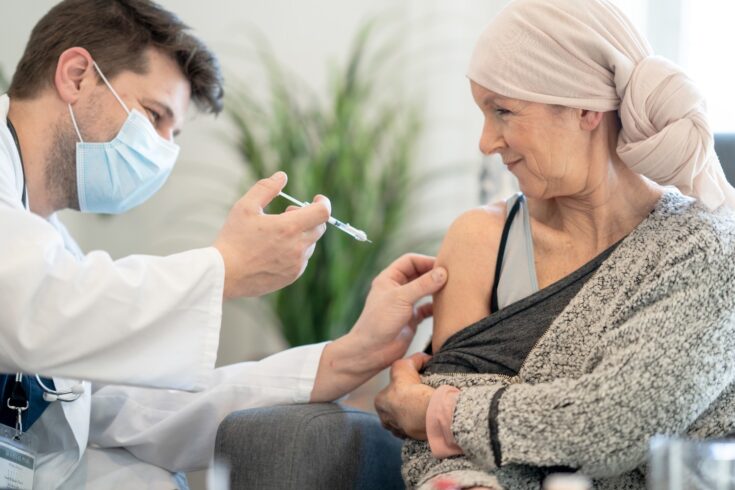The OCTAVE (Observational Cohort Trial-T-cells Antibodies and Vaccine Efficacy in SARS-CoV-2) study is one of the largest studies in the world so far into post-SARS-CoV-2 vaccination in immunocompromised patients. It is funded by the Medical Research Council (MRC).
It was set up in the middle of the COVID-19 pandemic to evaluate, in real time, the immune responses following COVID-19 vaccination in patients who are having a stem cell transplant or with immune-mediated inflammatory diseases such as:
- cancer
- inflammatory arthritis
- diseases of the kidney or liver
The study is a collaboration involving groups in the:
- University of Glasgow
- University of Birmingham
- University of Oxford
- University of Liverpool
- Imperial College London
- Leeds Teaching Hospitals NHS Trust
Preliminary versus peer-reviewed data
Preliminary data from the landmark study in August 2021 showed that a significant proportion of clinically at risk patients with immunocompromised or immunosuppressed conditions, mounted a low, or undetectable, immune response after two doses of the same SARS-CoV-2 vaccine.
Now, in new peer-reviewed data, researchers are able to share the real-world infection outcomes for this clinically at risk group.
Data from the study covers the time period from 2021 to mid-2022, and include patients infected with the alpha, delta and omicron strains of SARS-CoV-2.
The data does not estimate the impact of third and fourth vaccinations, which have since been offered to patients in the groups studied.
Overall infection rate low
The new data shows that while in most at risk patient groups the overall COVID-19 infection rates were low, the risk of severity and death from SARS-CoV-2 was high in a sub-group of conditions, despite vaccination.
This was particularly the case during the delta wave. Furthermore, the data show that while Omicron, now the dominant SARS-CoV-2 strain worldwide, saw a rise of infection rate among at risk patients, fewer of them became severely unwell or died.
Previously, preliminary data released from OCTAVE in 2021 showed that while most patients mounted a successful immune response after two doses of the vaccine. However, some patients with certain immunosuppressed conditions mounted a low, or undetectable, immune response.
The study found that overall 12% of patients on the trial failed to develop antibodies, with an additional 27% only generating low levels of antibodies. Some patients also failed to generate adequate T-cell responses after vaccination.
Vaccine failure in some groups
Vaccine failure rates were higher in some subgroups including patients:
- with ANCA-associated vasculitis on the drug rituximab
- receiving haemodialysis and also on immunosuppressive therapy
- who were solid organ transplant recipients
The study used a variety of state-of-the-art immune tests performed on blood samples taken before or after COVID-19 vaccination. It also used infection and severity data on patients to better understand the real-world impact of a low vaccination response in these patient groups.
In the UK, more than 60% of people aged over 65 were known to have one or more chronic disease in 2019. At the same time more than 12 million people aged 18 to 65 were living with a chronic condition lasting longer than 12 months.
Government estimates suggest that around 500,000 people have an immune suppressive disease in the UK. A significant group which may be more at risk of severe COVID-19 infection if not fully protected by vaccination.
Provided vital insights
Professor Iain McInnes, lead of the OCTAVE trial, and Vice Principal and Head of the College of College of Medical, Veterinary and Life Sciences at the University of Glasgow, said:
The OCTAVE study has provided vital insights into the effectiveness of SARS-CoV-2 directed vaccines in some of our most vulnerable patient groups.
The study’s key strengths include identifying the small number of patients who may not respond to the vaccines, enabling healthcare providers and policy makers to make the best decisions to protect these groups of people.
Importantly the study has also been able to reassure us that the majority of our immunocompromised patients in the UK have been protected from severe COVID-19 by the vaccination programme.
Enabled by collaborative efforts
Dr Jonathan Pearce, Director of Strategy and Planning, MRC said:
The important findings of the OCTAVE study were critically enabled by the collaborative efforts of researchers, hospitals and participants from across the UK.
Their combined commitment ensured that the study provided robust insights of value to our response to COVID-19 and for our preparation for future pandemics.
Areas to be addressed
Professor Pamela Kearns, Director of the Cancer Research UK Clinical Trials Unit at the University of Birmingham said:
OCTAVE provides an important understanding of how vaccines provided protection for many groups of the most clinically vulnerable, and how the variants of the disease affected how effective they were.
We can see that there are areas of particular concern where vaccines didn’t adequately protect against COVID 19, including some patients with renal diseases and some inflammatory conditions.
We’re immensely grateful for all those participants and each of the centres that took part to give us the clearest picture yet of how the most clinically vulnerable were protected, and where there are areas of weakness that need to be addressed.
Further information
The study, ‘SARS-CoV-2 specific humoral and T-cell responses and clinical outcomes following COVID-19 vaccination in patients with immune suppressive disease-a phase-III multicentre study-OCTAVE’ is published in Nature Medicine.

